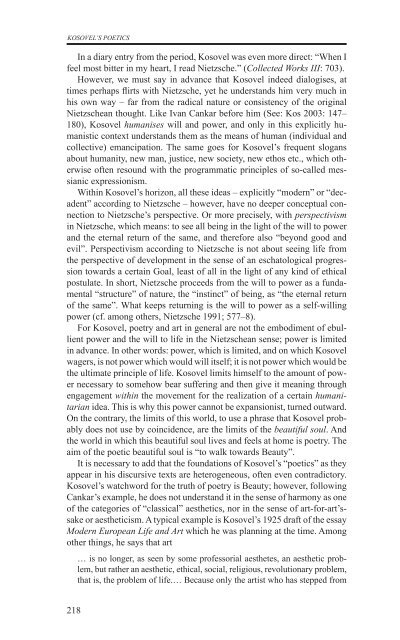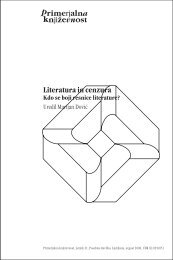razprave (pdf) - Društvo za primerjalno književnost - ZRC SAZU
razprave (pdf) - Društvo za primerjalno književnost - ZRC SAZU
razprave (pdf) - Društvo za primerjalno književnost - ZRC SAZU
- No tags were found...
Create successful ePaper yourself
Turn your PDF publications into a flip-book with our unique Google optimized e-Paper software.
KOSOVEL’s poeticsIn a diary entry from the period, Kosovel was even more direct: “When Ifeel most bitter in my heart, I read Nietzsche.” (Collected Works III: 703).However, we must say in advance that Kosovel indeed dialogises, attimes perhaps flirts with Nietzsche, yet he understands him very much inhis own way – far from the radical nature or consistency of the originalNietzschean thought. Like Ivan Cankar before him (See: Kos 2003: 147–180), Kosovel humanises will and power, and only in this explicitly humanisticcontext understands them as the means of human (individual andcollective) emancipation. The same goes for Kosovel’s frequent slogansabout humanity, new man, justice, new society, new ethos etc., which otherwiseoften resound with the programmatic principles of so-called messianicexpressionism.Within Kosovel’s horizon, all these ideas – explicitly “modern” or “decadent”according to Nietzsche – however, have no deeper conceptual connectionto Nietzsche’s perspective. Or more precisely, with perspectivismin Nietzsche, which means: to see all being in the light of the will to powerand the eternal return of the same, and therefore also “beyond good andevil”. Perspectivism according to Nietzsche is not about seeing life fromthe perspective of development in the sense of an eschatological progressiontowards a certain Goal, least of all in the light of any kind of ethicalpostulate. In short, Nietzsche proceeds from the will to power as a fundamental“structure” of nature, the “instinct” of being, as “the eternal returnof the same”. What keeps returning is the will to power as a self-willingpower (cf. among others, Nietzsche 1991; 577–8).For Kosovel, poetry and art in general are not the embodiment of ebullientpower and the will to life in the Nietzschean sense; power is limitedin advance. In other words: power, which is limited, and on which Kosovelwagers, is not power which would will itself; it is not power which would bethe ultimate principle of life. Kosovel limits himself to the amount of powernecessary to somehow bear suffering and then give it meaning throughengagement within the movement for the reali<strong>za</strong>tion of a certain humanitarianidea. This is why this power cannot be expansionist, turned outward.On the contrary, the limits of this world, to use a phrase that Kosovel probablydoes not use by coincidence, are the limits of the beautiful soul. Andthe world in which this beautiful soul lives and feels at home is poetry. Theaim of the poetic beautiful soul is “to walk towards Beauty”.It is necessary to add that the foundations of Kosovel’s “poetics” as theyappear in his discursive texts are heterogeneous, often even contradictory.Kosovel’s watchword for the truth of poetry is Beauty; however, followingCankar’s example, he does not understand it in the sense of harmony as oneof the categories of “classical” aesthetics, nor in the sense of art-for-art’ssakeor aestheticism. A typical example is Kosovel’s 1925 draft of the essayModern European Life and Art which he was planning at the time. Amongother things, he says that art… is no longer, as seen by some professorial aesthetes, an aesthetic problem,but rather an aesthetic, ethical, social, religious, revolutionary problem,that is, the problem of life.… Because only the artist who has stepped from218
















